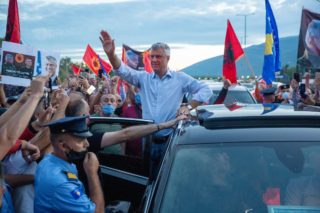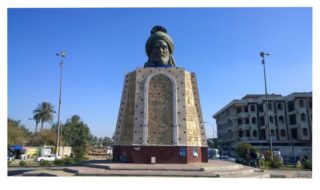QUITO – UNTIL 4AM the cars of revellers snaked through Quito’s Avenida de los Shyris, honking in celebration at the record-breaking win of Guillermo Lasso, a 65-year-old former banker who will soon be Ecuador’s new president. Not since the return of civilian rule in 1979 has a candidate managed to overcome a double-digit first-round deficit to win a run-off. Latin American presidents rang to congratulate him even before his victory speech in his home town of Guayaquil, as his win became more and more clear. With more than 98% of the vote counted, Mr Lasso has 52.5% to his leftwing rival Andrés Arauz’s 47.5%. “I will dedicate myself to the construction of a national project” of unity, he said in his victory speech. Rather than continue peddling the fraud allegations he made earlier in the day, Mr Arauz conceded.
It was a fitting end to a campaign full of surprises. Mr Lasso’s chances, as a conservative Catholic, initially seemed slim. Mr Arauz had a formidable campaign machine, one that catapulted him from obscurity to presidential favourite in less than a year. In the first round on February 7th, Mr Arauz, an economist who served under Rafael Correa, a populist leftist who governed Ecuador for a decade until 2017, won 32.7% of the vote. Mr Lasso barely scraped into the run-off with less than 20%, edging out the indigenous party candidate, Yaku Pérez, by only 30,000 votes. A fourth candidate, Xavier Hervas, came out of nowhere to win 15%.
But in the second round, Mr Lasso was able to broaden his appeal to young voters—those who are interested in environmental issues such as oil and mining development. Feminists demanded he tackle violence against women, and raged at a ban, imposed by Mr Correa’s government, on abortions even in the case of rape. Mr Lasso also promised to reduce the pay disparity between men and women, to feed chronically undernourished children and to fix Ecuador’s incompetent public-health system. (Since late February, three health ministers have resigned amid severe shortcomings in the distribution of covid-19 vaccines.)
Mr Arauz meanwhile struggled with the legacy of his mentor. Many feared Mr Correa would want to pull his strings from Belgium, where he moved after leaving office. (He has been unable to return since he was sentenced last year to eight years in jail for corruption.) When asked by an environmentalist whether his administration would resume hounding activists, as under Mr Correa, Mr Arauz was unable to squeak out more than “I hope not.” Unhelpfully, Mr Correa appeared on social networks howling for vengeance, attacking on Twitter people such as human-rights campaigners who had lobbied to reintroduce term limits in 2018. By contrast, Mr Lasso poked fun at Mr Arauz and was calmly critical. In the first debate between candidates in almost 40 years, Mr Lasso repeatedly told his adversary, “Andrés, don’t lie again.”
But electoral arithmetic also worked in Mr Lasso’s favour. The indigenous party, Pachakutik, called on voters to spoil their ballots, and 17% of the electorate duly did so. It claimed that Mr Lasso had reached the second round thanks to fraud (he denies this). In the end that helped Mr Lasso, since it lowered the bar for him to win, says Carlos Cuenca, a mathematician.
Mr Lasso faces a tough economic climate—in the past year GDP shrank by 7.8%. But investors cheered his victory. He broadly supports a $6.5bn loan package from the IMF signed by outgoing government of Lenín Moreno, of which $2.5bn remains to be disbursed. Mr Lasso favours reforms to boost the competitiveness of Ecuadorean businesses.
However, other problems remain, not least the scarcity of covid-19 vaccines. Mr Lasso can count on the backing of only 31 of the National Assembly’s 137 legislators, which means that in order to get laws passed, he will need the support of Pachakutik, the social democrats and others. Nonetheless, after 14 years of deeply confrontational politics first under Mr Correa and then under his nemesis, Mr Moreno, the prospect of change is a relief to many. If Mr Arauz had won, “I wouldn’t have known under which rock to hide,” said a dean at a private university in Quito, who has received threats of violence for criticising Correísmo. As such, it seems fitting that Quito’s revellers celebrated in front of the ruins of Mr Correa’s old party headquarters, torn down over the weekend by a property developer.
By The Economist





